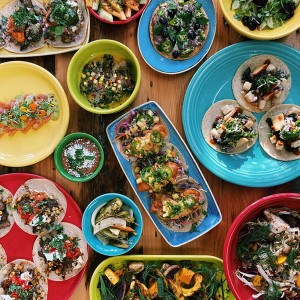Modern Draught Picks Up Where the Beer Scene Has Lagged

Modern Draught’s Mattie Bailey installs a new system at Michael Scelfo’s forthcoming Waypoint. / Photo provided
Industry veterans Mattie Bailey and Kristopher Crowell have seen some stuff—that is, corroded keg lines, gunky metal faucets, and other unsavory equipment that touches your beer.
Now the cofounders of Modern Draught, a full-service draft system installation and maintenance company, both men have worked at bars, restaurants, and even breweries for a decade. They have seen unprecedented growth in the craft beer industry, but it’s happened alongside stagnation in the way equipment is maintained. They launched Modern Draught onto the Boston scene five months ago to change that.
“One of the things we’re seeing is that a lot of these older systems were built in the Anheuser-Busch, MillerCoors era. They were basically built to pour very similar products,” says Bailey, who has helped open six Boston-area restaurants, including assisting opening beer director Megan Parker-Gray launch Row 34’s venerable program. He has also staged at the Trillium brewery in Boston.
Crowell, who got his start at restaurants in Florida, quickly learned the industry service standard didn’t include regular, full system inspections—after a maintenance visit, maybe a faucet wasn’t cleaned, or some parts weren’t tested, or lines didn’t get a final flush. It only takes one improperly closed gas valve to ruin a keg of beer, and potentially a whole night of service, he says.
“You hear terms like ‘slippage’ in the industry,” Crowell says, a word that refers to beer that’s poured but doesn’t turn into revenue. “Most restaurateurs and publicans, they call it a ‘drain tray.’ It’s supposed to be a drip tray. If you have beer going down the drain, you’re doing something wrong. It’s become acceptable to waste stuff. Just out of respect, for the brewers and the patrons, this stuff should be tuned up.”
“Beer has changed” over the past 15 years, Bailey says. “When you didn’t have that many differences in styles, pressure, levels of carbonation and acidity, and all these different aspects of beer, things were a lot simpler. As it becomes more complex, the problem is we’re not changing with it. [Modern Draught is] trying to make people aware that there are better products out there. Not necessarily that the old way was bad, but the new way is better.”
When Crowell moved to Boston in 2013, he launched a Modern Draught prototype, called Boston Pro Draught. Early this year, he teamed up with Bailey, and now Modern Draught services 33 restaurants, including Branch Line, Brewer’s Fork, Tasty Burger, and Lulu’s Allston, six breweries, including the soon-to-open Exhibit ‘A’ Brewing, and multiple non-industry clients, like the offices of Wayfair. Their services go beyond simply cleaning draft lines.
“You would never go to a restaurant that just cleaned its plates, but never cleaned a fork, spoon, and knife,” Bailey says. “But that’s basically what line cleaning is: You’re just cleaning the vessel the beer travels through. But the faucet itself needs to come off and be cleaned. The coupler that attaches to the keg that pierces the opening right to the beer, that part needs to be cleaned, too. A lot of that stuff is just not [typically] being done.”
Every Modern Draught visit includes a full system assessment, and the company does new installs (they just set up the system at Michael Scelfo’s forthcoming Waypoint), educational training, and sells small repair kits, too.
They’re not the first company to take such an approach. Crowell shouts out Don Jaillet at Massachusetts-based Custom Beverage Services, New York’s Ben Granger (Bierkraft, Other Half Brewing), and a couple other beverage professionals who “have improved dispense technology for the whole country.” Everyone benefits from a focus on this aspect of the industry, he says.
“The customer’s going to win by getting quality product, the actual establishment is going to be viewed in higher regard because they’re taking on the process it takes to make something quality, and they’ll benefit from return patronage,” Crowell says. “We’re trying to create a new benchmark. [The standard] doesn’t have to be the way it is. The market can grow, and our company’s proving that by the fact that we’re in demand right now.”


